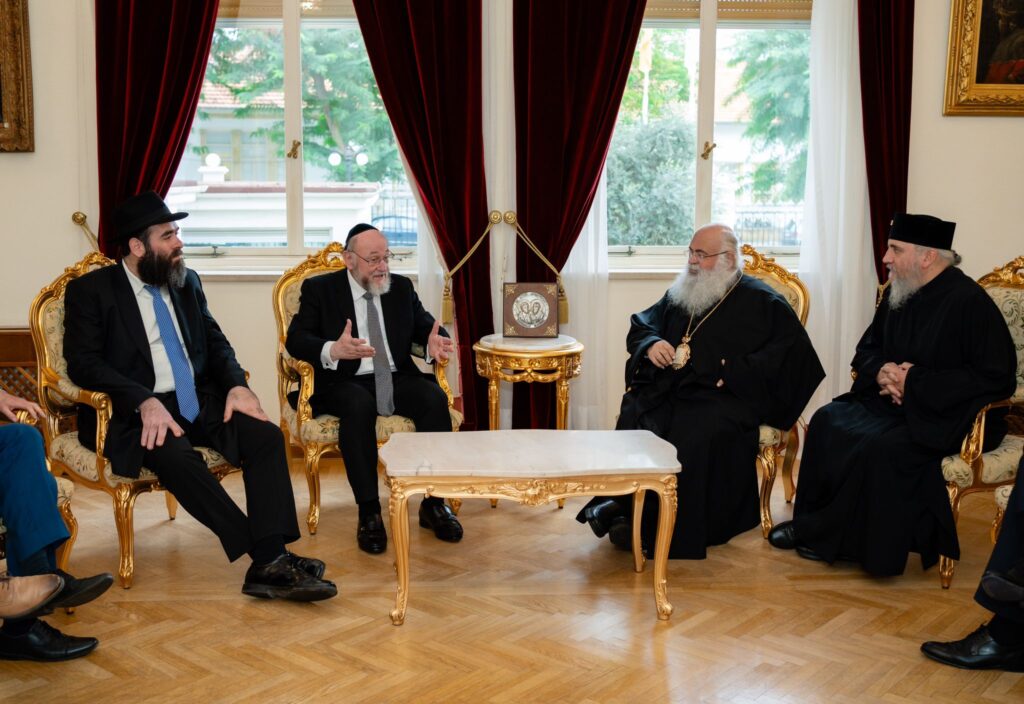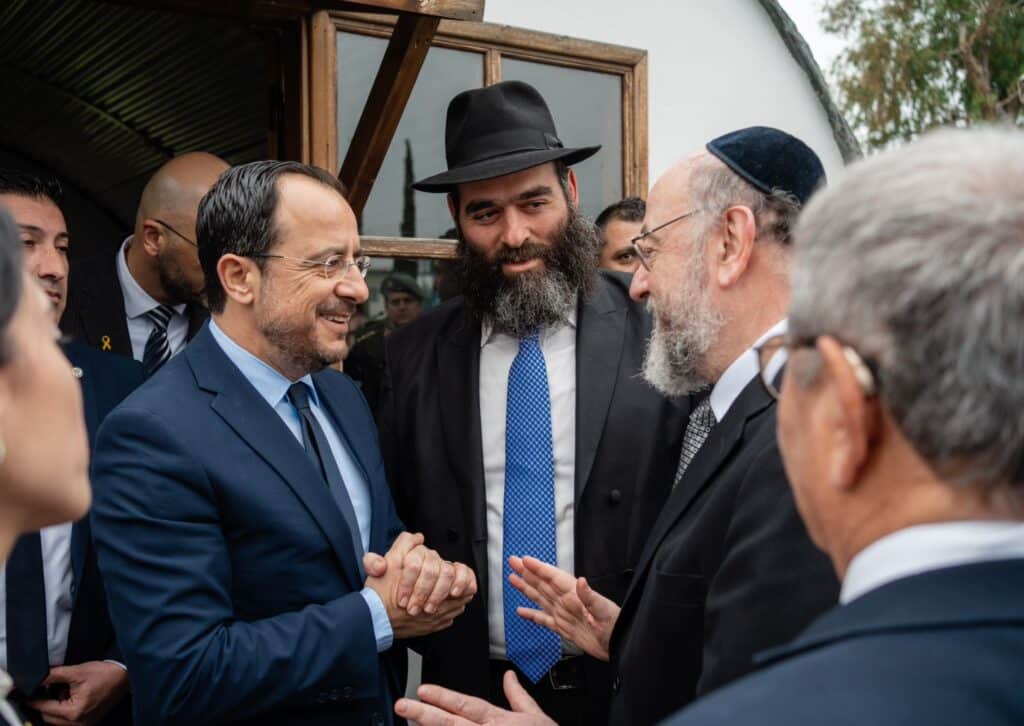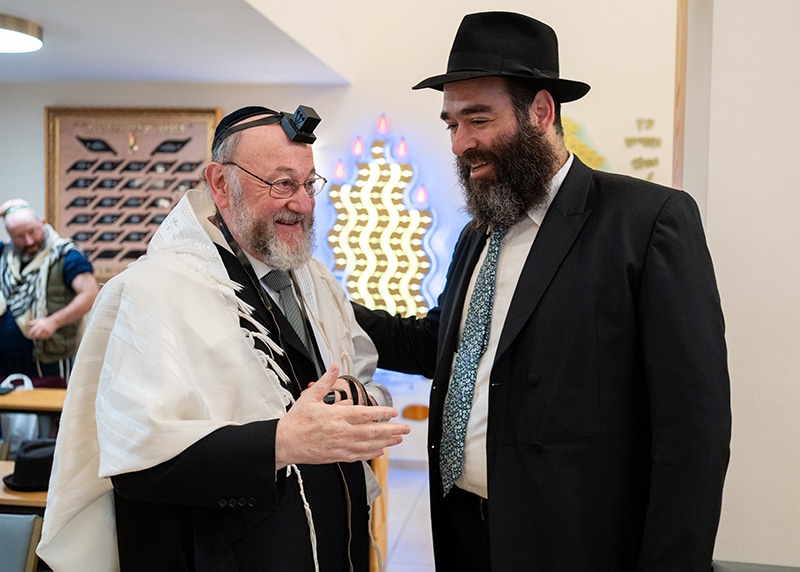Peace is the crucial element of life, the UK’s chief rabbi tells THEO PANAYIDES. He is a jovial man whose lifelong goal was to become a rabbi, now more comfortable discussing the afterlife than the situation in Gaza, the social work of his status rather than political ramifications
I first glimpse Sir Ephraim Mirvis KBE – Chief Rabbi of Britain and the United Hebrew Congregations of the Commonwealth – from a distance, at the welcoming ceremony on his first day in Cyprus.
We’re at Chabad Lubavitch, the Jewish synagogue and community centre in Larnaca, and he’s being shown around the Jewish Museum of Cyprus, currently a modest affair focused on the camps where thousands of Jews were confined in 1946-48 en route to Israel. (A much larger, seven-floor museum is being planned on the same site.) I glance at him nodding and beaming as his hosts explain in Hebrew, an avuncular figure with trim beard and black yarmulke, then being introduced to local British Jews and making small talk: “You live here? In Larnaca?”. He’s jovial, urbane, soft-spoken: “Really?… How nice…”
Then we get to the speeches: a representative from the mayor of Larnaca, then the Israeli ambassador, then Sir Ephraim himself, speaking off-the-cuff without notes. The first speech is a short introduction by a young official from the Chabad, who opens with the following parable:
‘There was once a village that was famous for its wine. One day it was announced that the king planned to visit this village. To ensure that everyone was represented, a communal barrel was set up in the village square and all winemakers were invited to pour a sample of their wine into the barrel, so the king could try wine from all the vineyards. One smart individual, however, decided that it wasn’t worth wasting his precious vintage on this project, so instead he secretly poured a cup of water into the barrel.
‘The day of the king’s visit arrived. A cup was taken from the barrel and presented to him – but the cup, it turned out, contained nothing but water! It seems all the other villagers had been just as “smart” as that individual. And so the king’s visit was ruined.’

Chief Rabbi Mirvis and Raskin with Cyprus Archbishop George
It’s not the most obvious choice for an introductory anecdote. One might’ve expected something touching specifically on the guest of honour, or perhaps a riff on the meaning of the word ‘rabbi’ (literally ‘teacher’) – but in fact the choice of story is telling, because it speaks to a broader reality. Jews – perhaps not all Jews, but certainly devout Orthodox Jews – are forever being called upon to stick together and do their bit for the collective, and anyone who thinks they’re too smart to play along may end up scuppering the whole project. Especially now, in the context of what the ambassador, in his own speech, called “a very difficult war that was forced on us”.
That reality colours every word of my brief conversation with Sir Ephraim Mirvis – which is rather general, in any case. He prefers not to get tied down in specifics, for various reasons. One is that our time is limited. Another, I assume, is that he doesn’t want to say too much while in a foreign country, especially one with increasingly close commercial ties to Israel. And a third, I suspect from our brief acquaintance, is that he’s not the type to touch the third rail of politics unless absolutely necessary. He comes across as scholarly and affable, a well-spoken man who’s happier discussing passages from the Torah, or the Jewish conception of the afterlife, than dwelling on the messy situation in Gaza.
He’s spoken out elsewhere, for sure. “What Israel is doing is the most outstanding possible thing that a decent, responsible country can do for its citizens,” he declared in a speech at Cranbrook synagogue on January 10. He’s been speaking out since he became Chief Rabbi 11 years ago (it comes with the job), thus for instance he wrote an op-ed in The Telegraph in 2014 – during the previous war in Gaza – charging that the conflict was being used “as a pseudo-legitimate medium for latent anti-Semitism”, the same charge that’s being made in the current war.

Defending a ‘difficult’ war is not his preferred position. After all, as he tells me – thinking back to his childhood – he was raised to be proud of “our Jewish sensitivity and empathy for others”, not exactly values one associates with waging war. This was in South Africa where he was born in 1956, the son of a rabbi – and growing up in apartheid-era South Africa (the country, lest we forget, which has now accused Israel of genocide at the International Court of Justice) was an eye-opening experience, allowing him “to encounter an oppressive and cruel country leadership” and try to rise above it.
His father preached against apartheid, and visited political prisoners on Robben Island. His mother “worked within the communities of people of colour, she had a prominent position there”. Sir Ephraim himself lays great emphasis on social projects, and is “a keen champion of the fight against climate change”; his wife Valerie was a front-line social worker for many years. (She was born in what was then Rhodesia; they first met at summer camp while in their teens, then again “properly” in Israel where they were both students.) Indeed, he affirms, his own vocation too is a form of social work.
“My whole life, there’s only one thing I’ve wanted to be, and that’s a rabbi,” he says, beaming happily – and the appeal, for him, isn’t just the scholarly side but also the social aspect, the “privileged position” of being with people “at life-cycle moments of significance. And therefore it provides an opportunity through which one hopes one can bring comfort and encouragement and inspiration to people – and can be of help to people.”
People are often cruel, though, I note. How to reconcile that with the existence of God?

The president of Cyprus with both Chief Rabbis
He nods, the social worker giving way to the Talmudic scholar: “So… One of the most crucial pillars of our faith is recognition of the free choice that we are endowed with, and the principle of reward and punishment. Our entire bible is built on that premise.”
God can’t be blamed for the doings of men (and women): “The Almighty has given us a state of neutrality, and He leaves it up to us whether to sanctify or desecrate… And therefore, in the aftermath of immense human suffering, the right question to ask is not ‘Where was God?’ but ‘Where was humankind?’. Where were people? How could they allow themselves, and how could others allow them, to reach such depths of depravity and cruelty?”
And the war in Gaza? As a man of faith, how does he deal with the suffering there?
“So… In terms of war in general, peace is right at the core of Jewish belief. One of God’s names is ‘Shalom’, which is ‘peace’” – and of course that’s also the Jewish word for greeting or taking leave of someone. Every major Jewish prayer ends with the sentiment of ‘shalom’, he tells me; every religious ceremony revolves around peace.
“Peace, therefore, is the crucial element of life.” Sir Ephraim pauses slightly, with the air of a teacher turning back to the class after writing an equation on the board. “Now. That’s a simple fact – but life is far more complex. Because sometimes one doesn’t choose whether to have conflict or not. One doesn’t choose whether to be engaged in bitterness, or to be a victim, or to have certain challenges.”
What about free choice, though? Didn’t he say we can always choose?
“Well, yes. But if, let’s say, somebody’s threatening to kill a person – that person does have free will to turn the other cheek, and be killed.” He gives a dry little chuckle. “Or you have free will to stand up and fight.” War is very sad, it goes against all their ideals: “At the same time, in order to defend one’s country, in order to defend one’s values, to defend one’s faith… sometimes, tragically, it is necessary to raise arms”.
I try to probe a bit further. Where, if anywhere, is his red line? Is there any point where he’d say ‘This goes too far, it’s no longer justifiable?’ – but the question is too knotty and intractable for a brief interview. “There’s a huge amount in Jewish religious literature on the subject,” he informs me, meaning how and when to wage war. “Interestingly, in the Hebrew language, every single word for war and the implements of war has something to do with food. So for instance war is ‘milchama’, it comes from the root ‘lechem’, which means bread”. Maybe it’s a question of war (like food) being about survival – and there’s no doubt that many Jews do genuinely view Gaza as a war for Israel’s survival, ignoring the increasingly mainstream view that what’s happening there is outrageous.
Then again, being outside the mainstream – often radically so – is a common thing for Jews, especially Orthodox Jews like himself (around 70 per cent of British Jews are Orthodox, says Sir Ephraim a little surprisingly; 53 per cent are “centrist Orthodoxy, which I would be a leader of”). He’s considered quite liberal, and has reached out to women and the gay community – “I’m pleased that I wrote a booklet in 2018 which was the first-ever Jewish Orthodox guide to LGBT+ students in our schools” – yet he still insists that women can’t be rabbis, and homosexual acts are prohibited.
‘Inclusion’, a big word in secular life, is also part of his own vocabulary. “We have made inclusion a very important element of my leadership,” he tells me – yet, for instance, one of the examples he gives is that “couples who are childless will be welcome within our communities, and there will be no stigma attached to them in any way”. (Meanwhile, eco-warriors in Britain often chide people for having kids in the first place, urging them to remain childless for the good of the planet.) Sir Ephraim Mirvis KBE is firmly entrenched in British public life, from his beautiful use of English – with a very slight trace of South Africa – to his passion for Tottenham Hotspur, yet he’s also part of a traditional bubble-world that’s quite different from British norms, and has barely changed over centuries.
The biggest difference may be patriotism: Brits are increasingly embarrassed by Britain, but Jews wax rhapsodic when it comes to Israel. “Cyprus, in Jewish history, has been the gateway to the greatest place on earth – which is Israel!” he says in his welcome speech. The precise role of Cyprus in today’s historical moment is less clear-cut. It’s “a place that is oozing with potential,” says Sir Ephraim, adding that “it’s very important that Cyprus as a nation should support the Jewish community” – but what does that mean, support of what and potential for what? A state of war is hardly business as usual.
He himself supports the war, and Israel’s right to defend itself. It could hardly have been otherwise – yet I still get a sense that political discourse is something he does because he has to, part of his duty to the collective project. It definitely seems like he’d be happier studying the sacred Jewish texts, or at home with his family (he and Rachel have four children and 12 grandchildren; a fifth child passed away from cancer in 2011), or dealing in the warm social work – helping people, advising people – that comes with being a rabbi.
Any other passions? “Lots of other passions!” he replies happily, nodding and beaming like he did when I first saw him. Music is a huge part of his life, sports are another – mostly as a fan nowadays, but “when I was a kid I used to play football and cricket and rugby and chess and table tennis, those were the sports I represented my schools in. Never brilliant at any of them,” he adds modestly. Our interview winds down as lunch is brought in, a late-morning feast to celebrate the opening day of his visit. In Gaza, the war continues.







Click here to change your cookie preferences